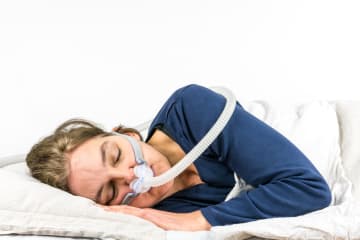Overview

Sleep apnea means that you frequently stop breathing for 10 seconds or longer during sleep. It can be mild to severe, based on the number of times an hour that you stop breathing.
Blocked or narrowed airways in your nose, mouth, or throat can cause sleep apnea. Your airway can become blocked when your throat muscles and tongue relax during sleep.
You can help treat sleep apnea at home by making lifestyle changes. You also can use a CPAP breathing machine that keeps tissues in the throat from blocking your airway. You may use a mouth or nose device while you sleep to help keep your airway open. Surgery may be an option for some people. Surgery may be done to implant a nerve stimulation device in the chest that helps keep the airway open. Surgery can also be done to remove enlarged tissues that are blocking the throat.
Follow-up care is a key part of your treatment and safety. Be sure to make and go to all appointments, and contact your doctor if you are having problems. It's also a good idea to know your test results and keep a list of the medicines you take.
How can you care for yourself at home?
- Reach and stay at a weight that's healthy for you. Talk to your doctor if you need help losing weight.
- Sleep on your side. It may help mild apnea.
- Avoid alcohol and medicines like sleeping pills, opioids, or sedatives before bed.
- Don't smoke, vape, or use other tobacco or nicotine products.
- Prop up the head of your bed.
- Treat breathing problems, like a stuffy nose, that are caused by a cold or allergies.
- Try a continuous positive airway pressure (CPAP) breathing machine if your doctor recommends it.
- If a CPAP doesn't work for you, ask your doctor if you can try other masks, settings, or breathing machines.
- Try oral breathing devices or other nasal devices.
- Tell your doctor if your nose feels dry or bleeds, or if it gets runny or stuffy when you use a breathing machine.
- Tell your doctor if you're sleepy during the day and it affects your daily life. Don't drive or operate machinery when you're drowsy.
- If you're having surgery, tell your doctor you have sleep apnea. Some medicines that are used to help you sleep during surgery and control pain can make it harder to breathe. But your doctor can take extra steps to help keep you safe.
When should you call for help?
Watch closely for changes in your health, and be sure to contact your doctor if:
- You still have sleep apnea even though you have made lifestyle changes.
- You are thinking of trying a device such as CPAP.
- You are having problems using a CPAP or similar machine.
- You are still sleepy during the day, and it affects your daily life.
Where can you learn more?
Go to http://www.healthwise.net/patientEd
Enter J936 in the search box to learn more about "Sleep Apnea: Care Instructions".
Current as of: October 1, 2025
Author: Ignite Healthwise, LLC Staff
Clinical Review Board
All Ignite Healthwise, LLC education is reviewed by a team that includes physicians, nurses, advanced practitioners, registered dieticians, and other healthcare professionals.

